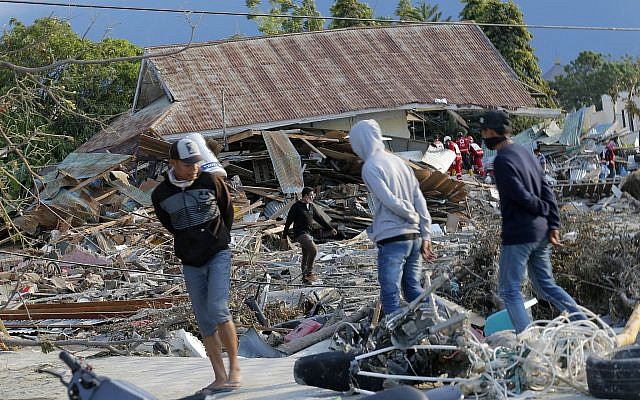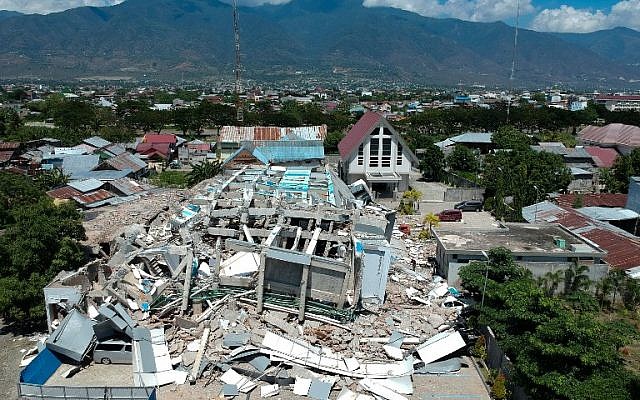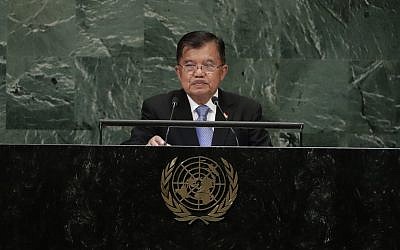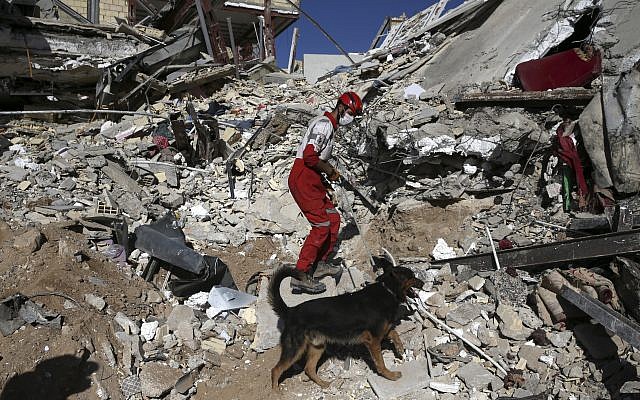Officials won’t say why no help offered after quake, with 1,200 dead and 200,000 in need; Jerusalem has aided Turkey, Haiti, Philippines, Nepal, reached out to Iraq, even Iran

Several days after an earthquake and tsunami devastated parts of Indonesia, killing more than 1,200 people, the Israeli government has yet to publicly offer to send emergency aid or any other kind of assistance to the country.
In the past, Israel has sent large delegations to disaster-stricken areas, and offered to send help to others hit by disasters, including countries with which it has no diplomatic relations.
Teams from the Israeli army provided rescue and medical services after an earthquake in Turkey in 1999, an earthquake in Haiti in 2010, a typhoon in the Philippines in 2013 and, most recently, an earthquake in Nepal in 2015.
Last year, Prime Minister Benjamin Netanyahu offered aid to earthquake victims in Iran and Iraq, two countries with which Israel does not have diplomatic relations; those offers were rebuffed.
On Friday, a 7.5 magnitude earthquake hit the island Sulawesi, in central Indonesia, and triggered a tsunami. Nearly 1,350 people have died as a consequence of the natural disaster.
Almost 200,000 people are in need of urgent help, the United Nations says, among them tens of thousands of children.

Survivors are battling thirst and hunger, with food and clean water in short supply, and local hospitals are overwhelmed by the number of injured.
But as of Tuesday evening, official Israel has not offered to send any help. Both the Foreign Ministry and the Prime Minister’s Office ignored several queries by The Times of Israel asking why Jerusalem was not displaying the same readiness to help it has shown various other countries in the past.

Jerusalem and Jakarta do not have formal diplomatic relations but there are unofficial contacts, and Israel has expressed interest in forging ties.
Netanyahu met with Indonesian Vice President Jusuf Kalla in New York last week, a rare public meeting of top-level officials from the two countries. Indonesia, the most populous Muslim country in the world, has historically shied away from open contacts with Israel.
The meeting between Netanyahu and Kalla, which occurred at the sidelines of the United Nations General Assembly, was first reported by Army Radio.
On Tuesday, Kalla confirmed that he had met the Israeli leader, though he described the meeting as spontaneous and brief.
“There were 190 heads of state, presidents and vice presidents, prime ministers, etc there. Many agenda came at the same time. You could come face to face with anyone. You could not have avoided it. [Netanyahu] was suddenly just beside me. Should I have turned around?” he said, according to Indonesian media.
Israel in the past has described its disaster relief efforts as both humanitarian driven and a form of public advocacy, showing a side of the country often overlooked by the international community. Some critics have derided the practice as so-called “rubble-washing.”
Helping other countries in need is “the most effective kind of diplomacy,” then-foreign minister Avigdor Leiberman said in 2015. “In crafting a country’s image, nothing is more effective than providing aid.”
In November 2017, Netanyahu said Israel had offered assistance, via the Red Cross, to the people of Iraq and Iran after a magnitude 7.3 quake killed at least 530 people injured thousands across the region.
“I just saw the pictures of the destruction in Iran and Iraq from this week’s earthquake. And I saw these heartbreaking images of men and women and children buried under the rubble. So I am proud to announce tonight that a few hours ago I directed that we offer the Red Cross medical assistance for the Iraqi and Iranian victims of this disaster,” Netanyahu said at the time.
“I’ve said many times that we have no quarrel with the people of Iran,” he added.

“Our quarrel is only with the tyrannical regime that holds them hostage and threatens our destruction. But our humanity is greater than their hatred. Israel continues to be a light unto the nations and this is what I am proud of. And all of you can be proud of Israel’s morals, and Israel’s might.”
An official in Netanyahu’s office said, however, the offer was immediately rejected.
“This shows the true face of the Iranian regime,” the official said.
As reported by The Times of Israel
